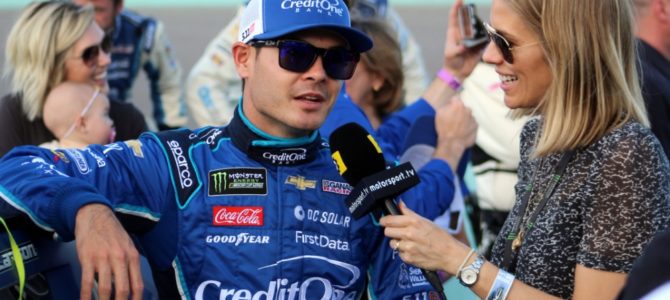
As the NASCAR season kicks off with Sunday’s 63rd Daytona 500, two events will mark the “Super Bowl of Stock Car Racing.” First, as the event marks 20 years since the death of Dale Earnhardt, Sr., on the last lap of the 2001 Daytona 500, many in the auto racing community have focused on how Earnhardt’s death helped revolutionize safety innovations over the past two decades.
Another storyline represents a comeback story — one of both transgression and redemption. Kyle Larson will return to NASCAR driving for Hendrick Motorsports, winner of 13 championships in the sport’s elite Cup Series. It was an outcome few might have foreseen, after a tumultuous 2020 for both the world and Larson.
A Rapid Fall from Grace
Last spring, the 28-year-old Larson found his world collapsing around him. On Easter Sunday, competing in a virtual racing event while NASCAR remained shut due to the coronavirus, Larson used a racial slur during a live webcast.
The consequences for using the N-word were immediate and severe. NASCAR suspended him indefinitely, and major corporations like McDonald’s, Credit One Bank, and Chevrolet dropped their sponsorship. His NASCAR team at the time, Chip Ganassi Racing, suspended Larson then terminated him the following day.
In addition to being insensitive, offensive, and boorish, Larson’s casual use of the slur also seemed inexplicable. As someone with a middle name of Miyata, a Japanese American mother, and whose grandparents spent time in a World War II internment camp, Larson knew firsthand what it means to face racial discrimination and ugly stereotypes. Given his background, one would view him as the last person to be caught using a racial slur.
Redemption
Yet Larson did use that slur, and had to face up to not just the consequences of his actions, but what led to them — and how he could change. In an eloquent essay posted on his personal website last October, he explained a process of both seeking understanding and forgiveness.
Larson wrote of having to apologize to one of his African-American teammates, and to students at the Urban Youth Racing School he had previously visited. If having to explain his conduct to a former teammate required a long look in the mirror, looking in the eyes of a child who had looked up to him, and explain to that child how he had let him down, would prompt no small amount of introspection.
Larson also discussed volunteer work he had performed in Minnesota, both before and after the death of George Floyd, and conversations he had with African-American racers and athletes about their experiences. While one hesitates to make definitive statements about what lies in another person’s heart, Larson’s behavior certainly seems consistent with someone who took the opportunity to gain a greater understanding of, and empathy for, others around him.
As he remained suspended by NASCAR, Larson continued to race. As a person who co-drove the winning car for the 24 Hours of Daytona at the ripe old age of 22, Larson just wants to race.
In exile from stock car racing, as Larson ran sprint cars on dirt he ran his competition into the ground. From last June through August, Larson won 23 events in 37 starts, winning nearly two-thirds of the races in which he entered. It seemed like every Sunday morning, I would wake up to find tweets about the latest track where, during the Saturday night feature the prior evening, Larson had conquered his opponents to extend his streak even further.
The combination of Larson’s domination on the dirt tracks and his contrition off of it paved the way for a return to NASCAR. Last fall, he applied for — and received — reinstatement by the sanctioning body. Within days, Hendrick Motorsports announced they had signed Larson to a multi-year contract.
The Value of Second Chances
The discussion surrounding “cancel culture” occasionally obscures two important points. Offensive behavior should bring consequences, but those consequences need not be eternal. Larson did not shirk from his punishment, conceding that he “was rightly suspended by NASCAR and fired from my job with a top-tier team” for his actions.
But he also found out firsthand how many individuals gave him that most precious commodity — the gift of forgiveness:
Being labeled a racist has hurt the most, but I brought that on myself. What I didn’t expect, though, were all the people who, despite their disappointment in what I did, made the choice not to give up on me. It motivates me to repay their faith by working harder, not giving up on myself, and making sure something positive comes from the harm I caused.
Falling from grace, yet realizing one has been saved by grace, in many ways defines the human experience across time, place, and religion. It also explains why, before he even takes the green flag at Daytona on Sunday, Kyle Larson already stands as a winner in the race of life.









